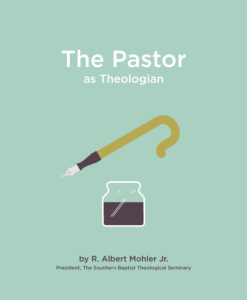Part V – The pastors confession
All this assumes, of course, that the pastoral ministry is first rooted in the pastor’s own confession of faith — the pastor’s personal theological convictions. The faithful pastor does not teach merely that which has historically been believed by the church and is even now believed by faithful Christians — he teaches out of…
All this assumes, of course, that the pastoral ministry is first rooted in the pastor’s own confession of faith — the pastor’s personal theological convictions.
The faithful pastor does not teach merely that which has historically been believed by the church and is even now believed by faithful Christians — he teaches out of his own personal confession of belief. There is no sense of theological attachment or of academic distance when the pastor sets out a theological vision of the Christian life.
All true Christian preaching is experiential preaching, set before the congregation by a man who is possessed by deep theological passion, specific theological convictions and an eagerness to see these convictions shared by his congregation.
[Tweet “Faithful preaching does not consist of the preacher presenting a set of theological options to the congregation.”] Instead, the pastor should stand ready to define, defend and document his own deep convictions, drawn from his careful study of God’s Word and his knowledge of the faithful teaching of the church.
Our model for this pastoral confidence is, once again, the Apostle Paul. Paul’s personal testimony is intertwined with his own theology. Consider Paul’s retrospective analysis of his own attempts at human righteousness, coupled with his bold embrace of the Gospel as grounded in grace alone.
“But whatever things were gain to me, those things I have counted as loss for the sake of Christ,” Paul asserted. “More than that, I count all things to be loss in view of the surpassing value of knowing Christ Jesus my Lord, for whom I have suffered the loss of all things, and count them but rubbish so that I may gain Christ, and may be found in Him, not having a righteousness of my own derived from the Law, but that which is through faith in Christ, the righteousness which comes from God on the basis of faith, that I may know Him and the power of His resurrection and the fellowship of His sufferings, being conformed to His death; in order that I may attain to the resurrection from the dead” [Phil 3:7-11].
In other words, Paul did not hide behind any sense of academic detachment from the doctrines he so powerfully taught. Nor did he set before his congregation in Philippi a series of alternate renderings of doctrine. Instead, he taught clearly, defended his case and made clear that he embraces these very doctrines as the substance of his life and faith.
Of course, the experiential nature of the pastor’s confession does not imply that the authority for theology is in personal experience. To the contrary, the authority must always remain the Word of God. The experiential character of the pastor’s theological calling underlines the fact that the preacher is speaking from within the circle of faith as a believer, not from a position of detachment as a mere teacher.
The pastor’s confession of his faith and personal example add both authority and authenticity to the pastoral ministry. Without these, the pastor can sound more like a theological consultant than a faithful shepherd. The congregation must be able to observe the pastor basing his life and ministry upon these truths, not merely teaching them in the pulpit.
In the end, every faithful pastor’s theological confession must include an eschatological confidence that God will preserve His work to the end. As Paul confessed, “For this reason I also suffer these things, but I am not ashamed; for I know whom I have believed and I am convinced that He is able to guard what I have entrusted to Him until that day” [2 Tim 1:12].
In the end, every preacher receives the same mandate that Paul handed down to Timothy: “Retain the standard of sound words which you have heard from me, in the faith and love which are in Christ Jesus. Guard, through the Holy Spirit who dwells in us, the treasure which has been entrusted to you” [2 Tim 1:13-14].
In other words, we are the stewards of sound words and the guardians of doctrinal treasure which has been entrusted to us at the very core of our calling as pastors. The pastor who is no theologian is no pastor.
___________

You can download the complete PDF of The Pastor as Theologian for Free here.
“Every pastor is called to be a theologian. This may come as a surprise to some pastors, who see theology as an academic discipline taken during seminary rather than as an ongoing and central part of the pastoral calling. Nevertheless, the health of the church depends upon its pastors functioning as faithful theologians — teaching, preaching, defending and applying the great doctrines of the faith.”
—R. Albert Mohler Jr.
See Also:
- Albertmohler.com
- Upcoming events featuring R. Albert Mohler Jr.


